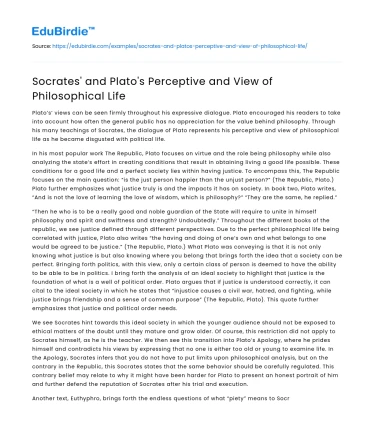Plato’s’ views can be seen firmly throughout his expressive dialogue. Plato encouraged his readers to take into account how often the general public has no appreciation for the value behind philosophy. Through his many teachings of Socrates, the dialogue of Plato represents his perceptive and view of philosophical life as he became disgusted with political life.
In his most popular work The Republic, Plato focuses on virtue and the role being philosophy while also analyzing the state’s effort in creating conditions that result in obtaining living a good life possible. These conditions for a good life and a perfect society lies within having justice. To encompass this, The Republic focuses on the main question: “is the just person happier than the unjust person?” (The Republic, Plato.) Plato further emphasizes what justice truly is and the impacts it has on society. In book two, Plato writes, “And is not the love of learning the love of wisdom, which is philosophy?” “They are the same, he replied.”
Save your time!
We can take care of your essay
- Proper editing and formatting
- Free revision, title page, and bibliography
- Flexible prices and money-back guarantee
“Then he who is to be a really good and noble guardian of the State will require to unite in himself philosophy and spirit and swiftness and strength? Undoubtedly.” Throughout the different books of the republic, we see justice defined through different perspectives. Due to the perfect philosophical life being correlated with justice, Plato also writes “the having and doing of one’s own and what belongs to one would be agreed to be justice.” (The Republic, Plato.) What Plato was conveying is that it is not only knowing what justice is but also knowing where you belong that brings forth the idea that a society can be perfect. Bringing forth politics, with this view, only a certain class of person is deemed to have the ability to be able to be in politics. I bring forth the analysis of an ideal society to highlight that justice is the foundation of what is a well of political order. Plato argues that if justice is understood correctly, it can cital to the ideal society in which he states that “injustice causes a civil war, hatred, and fighting, while justice brings friendship and a sense of common purpose” (The Republic, Plato). This quote further emphasizes that justice and political order needs.
We see Socrates hint towards this ideal society in which the younger audience should not be exposed to ethical matters of the doubt until they mature and grow older. Of course, this restriction did not apply to Socrates himself, as he is the teacher. We then see this transition into Plato’s Apology, where he prides himself and contradicts his views by expressing that no one is either too old or young to examine life. In the Apology, Socrates infers that you do not have to put limits upon philosophical analysis, but on the contrary in the Republic, this Socrates states that the same behavior should be carefully regulated. This contrary belief may relate to why it might have been harder for Plato to present an honest portrait of him and further defend the reputation of Socrates after his trial and execution.
Another text, Euthyphro, brings forth the endless questions of what “piety” means to Socrates. The constant analyses are what drove Socrates students into examining what perfect models are in truth and beauty which are how people judge their own experiences or object. The question of “Is piety good because the gods like it or do the gods like it because it is good?” remains unanswered even after five attempts of Euthyphro trying to define it.
Aristophanes’ Clouds shows a dismissive attitude to the veneration of intellectuals and the importance of the philosophic life. Aristophanes’ Clouds is a play starring and an elderly man in debt who enrolls his son in Socrates's philosophy school to learn the necessary rhetorical skills to win in court. The elderly father soon learns that Socrates's teachings are mostly just disrespectful in regards to authority and social mores, which then brings the elderly father to burning down the philosophical school. The clouds formed by the fire are a representation of the thoughts that hover over us without an exact form and are based on our experiences.
Aristophanes believes that piety, as discussed in Euthyphro, keeps us from corrupting the lives of each other. In the play, however, the elderly father ends up learning from the philosophers, which ends up corrupting others’ lives. Aristophanes’ reflection on philosophers and intellects is that the gods are just keeping everyone from being even worse than we already are. Throughout both Plato’s works and Aristophanes’ Clouds, we see that Socrates denied the capability of most men of philosophy. We see that in the Clouds, Socrates would not be able to qualify as a philosopher in Plato’s The Republic, and vice versa.
In the Republic, we see the criticism of unchecked democracy especially in correlation to excessive freedom which they deemed is linked to anarchy. Plato also expresses in his dialogue about how corrupt democracy is due to it is lacking in leaders who have not only proper skills but morals. In the Republic, he states that “Democracy depends on chance and must be mixed with competent leadership.” I solely agree with this statement as especially in today’s world we cannot have a leader who lacks empathy with no morals who cannot foresee right from wrong. If that were the case, we might as well have a robot as a leader to make our choices. This ties into Plato’s further analysis in which he expresses that politics need expert rulers who are not coincidentally but are molded and selected for the position. These rulers are guided by the common good and benefit so that their city reflects that and not a crippling society.






 Stuck on your essay?
Stuck on your essay?

